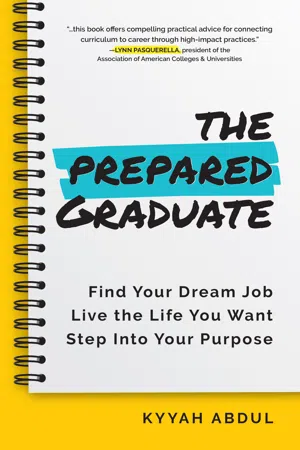
The Prepared Graduate
Find Your Dream Job, Live the Life You Want, and Step Into Your Purpose
- English
- ePUB (mobile friendly)
- Available on iOS & Android
The Prepared Graduate
Find Your Dream Job, Live the Life You Want, and Step Into Your Purpose
About this book
Professional Advice About Career Preparation for Soon-To-Be College Grads
"This book is so real and honest! I wish I had this when I first started out in my career....Every parent should read this book and then gift it to their child!" — Nancy Barrows, MS CC-SLP, LAUSD educator & speech language pathologist
#1 New Release in Career Development Counseling and Vocational Guidance
This book of professional advice about career preparation may be the best college graduation gift you'll receive.
Too many people end up working jobs they didn't study for. It's time you proactively prepare for post-graduate life. The Prepared Graduate speaks to Generation Z and Millennials, addressing many of the concerns students (and parents) have about pre- and post-graduation. Kyyah Abdul offers extensive job search tips and work advice, such as guidance on writing the perfect résumé, excelling in job interviews, networking in-person and online, negotiating job salaries, paying off student loans, and more.
Rely on trusted guidance. Armed with first-hand experience with the lack of preparation universities provide their students, Kyyah set out to forge her own path for finding relevant work post-graduation. Her strategies helped her land jobs in several STEM positions both during and after college. Over time, Kyyah created a comprehensive roadmap chockfull of work advice for college seniors through summer up until the end of their first year as a graduate.
The Prepared Graduate is the perfect college graduation gift that provides:
- Guidance on finding the right path for career success
- An easy-to-follow roadmap with advice about career preparation
- Endless job search tips
If you enjoyed What Color is Your Parachute? (2021); Brag Better: Master the Art of Fearless Self-Promotion; or You Turn: Get Unstuck, Discover Your Direction, and Design Your Dream Career, you'll love The Prepared Graduate.
Frequently asked questions
- Essential is ideal for learners and professionals who enjoy exploring a wide range of subjects. Access the Essential Library with 800,000+ trusted titles and best-sellers across business, personal growth, and the humanities. Includes unlimited reading time and Standard Read Aloud voice.
- Complete: Perfect for advanced learners and researchers needing full, unrestricted access. Unlock 1.4M+ books across hundreds of subjects, including academic and specialized titles. The Complete Plan also includes advanced features like Premium Read Aloud and Research Assistant.
Please note we cannot support devices running on iOS 13 and Android 7 or earlier. Learn more about using the app.
Information

The Intensifying Struggle
Table of contents
- Copyright
- Contents
- Introduction
- Part I
- Chapter 1 The Intensifying Struggle
- Chapter 2 Your TikTok-Worthy Vacation Can Wait
- Part II
- Chapter 3 The Year of Lasts
- Chapter 4 Winter Break
- Chapter 5 Second Semester
- Chapter 6
- Chapter 7 Savage Solitude
- Part III
- Chapter 8 One Degree Hotter
- Chapter 9 A Savage Life
- Afterword
- About the Author
- References